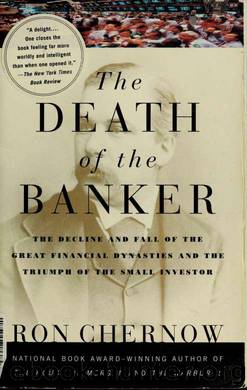The Death of the Banker: The Decline and Fall of the Great Financial Dynasties and the Triumph of the Small Investor by Ron Chernow

Author:Ron Chernow [Chernow, Ron]
Language: eng
Format: epub
Tags: Business & Economics, Banks & Banking, Finance, General, Banking, Financiers, Non-Fiction, History
ISBN: 9780375700378
Google: DmCuAAAAIAAJ
Amazon: 0375700374
Publisher: Vintage
Published: 1997-05-14T23:00:00+00:00
That bankers have surrendered their banking monopoly to their clients is evident everywhere on the financial scene today. Many companies once subservient to the House of Morgan and other elite investment houses have become sizable financial firms in their own right. General Motors sells insurance, makes loans, and issues mortgages. General Electric Capital Corporation heads a growing life-insurance empire and is a major issuer of commercial paper. IBM is deeply involved in home-banking and electronic-payments systems while AT&T issues credit cards. For five of the past six years. Ford Motor has actually made more money as a banker than as a car maker. The list could be expanded indefinitely. What makes these companies rugged competitors for even the most robust banks is that they possess top credit ratings—usually far superior to the banks'—can raise capital for expansion at low cost, and operate with few regulatory restraints. It is the old story of banking emerging spontaneously from successful commerce. Many "non-banks" that have bedeviled banks in recent years started out as industrial companies.
Anyone who doubts the freedom of blue-chip companies
J2 Ron Chernow
from their bankers should ponder the stockpiles of cash held by major American companies by the end of 1996. After several years of frenzied expansion, Microsoft had $9 billion in cash and short-term investments w^hile Intel had $8.2 billion. The Big Three automakers, w^ho long enriched Wall Street coffers, v^ere sitting on staggering piles of cash: $17 billion for General Motors, $154 billion for Ford Motor, and $7.8 billion for Chrysler. By late 1996 the liquid assets of all American companies outside the financial services sector had reached an extraordinary $679 billion as many American companies replicated the good fortune that Standard Oil had enjoyed a century before and become ersatz banks.
At this point in my argument, some skeptical readers are doubtless smirking. If the situation for the Wall Street firms is as gloomy as the author contends, why are they expanding so fast worldwide? Why do I keep reading about young hotshots pulling down multimillion-dollar salaries? Surely the banker can't be a dying breed if so many people are making so much money? The objection is a perfectly legitimate one. Nobody is being crucified or martyred on Wall Street. Firms such as Morgan Stanley and Goldman, Sachs are riding high, expanding around the globe, and booking record profits, and they seem anything but sickly. Even the commercial banks reaped a record $51 billion in profit for 1996—a fifth consecutive year of record profits. Hardly the results that would seem the occasion for my mournful requiem.
Well, right here I should beat my breast, shout mea culpa, and sheepishly make a confession. For the sake of accuracy, I should have entitled my essay ''The Death of Banking" instead of 'The Death of the Banker." For bankers have prospered mightily as they have cast off banking business in favor of other financial services. Both by instinct and long-range design, the smartest banks have explored and responded to the crisis I am describing here.
Download
This site does not store any files on its server. We only index and link to content provided by other sites. Please contact the content providers to delete copyright contents if any and email us, we'll remove relevant links or contents immediately.
International Integration of the Brazilian Economy by Elias C. Grivoyannis(57288)
The Radium Girls by Kate Moore(10902)
Turbulence by E. J. Noyes(7032)
Nudge - Improving Decisions about Health, Wealth, and Happiness by Thaler Sunstein(6629)
The Black Swan by Nassim Nicholas Taleb(6184)
Pioneering Portfolio Management by David F. Swensen(5599)
Rich Dad Poor Dad by Robert T. Kiyosaki(5140)
Zero to One by Peter Thiel(4817)
Man-made Catastrophes and Risk Information Concealment by Dmitry Chernov & Didier Sornette(4728)
Secrecy World by Jake Bernstein(3773)
Millionaire: The Philanderer, Gambler, and Duelist Who Invented Modern Finance by Janet Gleeson(3565)
Skin in the Game by Nassim Nicholas Taleb(3456)
The Age of Surveillance Capitalism by Shoshana Zuboff(3411)
The Money Culture by Michael Lewis(3276)
Skin in the Game: Hidden Asymmetries in Daily Life by Nassim Nicholas Taleb(3259)
Bullshit Jobs by David Graeber(3172)
The Dhandho Investor by Mohnish Pabrai(3161)
The Wisdom of Finance by Mihir Desai(3069)
Blockchain Basics by Daniel Drescher(2884)
